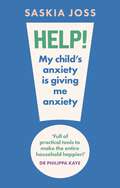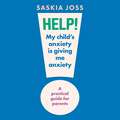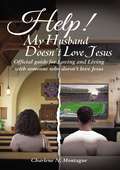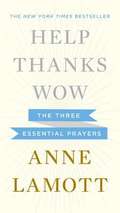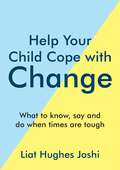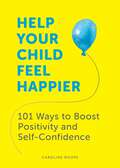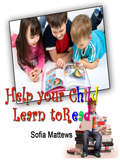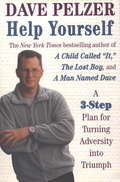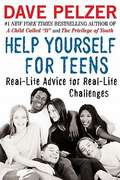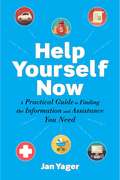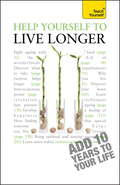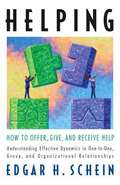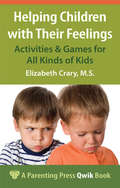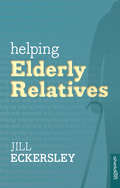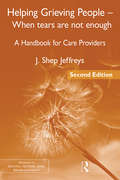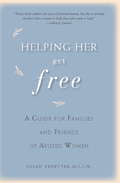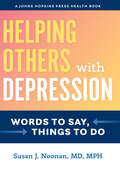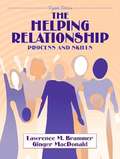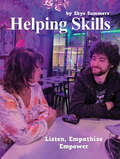- Table View
- List View
Help! My Child's Anxiety is Giving Me Anxiety
by Saskia Joss'Finally, a book that gives straightforward guidance to parents in need' Myleene Klass'Full of practical tools to make the entire household happier!' Dr Philippa Kaye The opposite of anxiety is not CALM. The opposite of anxiety is SAFETY. This book is full of practical, adaptable and easy to implement strategies for parents to help children of all ages and stages conquer their anxiety, by making them feeling safe and connected again. Parenting an anxious child makes parents anxious. When your child feels anxiety, panic, worry or sadness, it can make you feel anxious, panicked, worried or sad too. If you are fearful or overwhelmed, it can be difficult to support your child, even though all you want to do is make them feel better.Parents will learn what is going on in their child's brain and body when anxiety strikes, and also - crucially - what they can do to help. This book is full of practical advice and delivers clear spoken scripts for parents to follow when supporting and reassuring their anxious child. It also sets out hundreds of practical dynamic strategies to restore the child's happiness and security, all based on real-life examples that have arisen from personal therapeutic casework with hundreds of children.This book offers advice, reassurance and a helping hand, with a wide range of solutions and strategies, as well as issues covered - everything from separation anxiety to issues at school, phobias and so much more. Help! My Child's Anxiety is Giving Me Anxiety is designed to fit each family's specific requirements, replenish confidence and put the positivity and pleasure back into parenting.
Help! My Child's Anxiety is Giving Me Anxiety
by Saskia Joss'Finally, a book that gives straightforward guidance to parents in need' Myleene Klass'Full of practical tools to make the entire household happier!' Dr Philippa Kaye The opposite of anxiety is not CALM. The opposite of anxiety is SAFETY. This book is full of practical, adaptable and easy to implement strategies for parents to help children of all ages and stages conquer their anxiety, by making them feeling safe and connected again. Parenting an anxious child makes parents anxious. When your child feels anxiety, panic, worry or sadness, it can make you feel anxious, panicked, worried or sad too. If you are fearful or overwhelmed, it can be difficult to support your child, even though all you want to do is make them feel better.Parents will learn what is going on in their child's brain and body when anxiety strikes, and also - crucially - what they can do to help. This book is full of practical advice and delivers clear spoken scripts for parents to follow when supporting and reassuring their anxious child. It also sets out hundreds of practical dynamic strategies to restore the child's happiness and security, all based on real-life examples that have arisen from personal therapeutic casework with hundreds of children.This book offers advice, reassurance and a helping hand, with a wide range of solutions and strategies, as well as issues covered - everything from separation anxiety to issues at school, phobias and so much more. Help! My Child's Anxiety is Giving Me Anxiety is designed to fit each family's specific requirements, replenish confidence and put the positivity and pleasure back into parenting.
Help! My Child's Anxiety is Giving Me Anxiety
by Saskia Joss'Finally, a book that gives straightforward guidance to parents in need' Myleene Klass'Full of practical tools to make the entire household happier!' Dr Philippa Kaye The opposite of anxiety is not CALM. The opposite of anxiety is SAFETY. This book is full of practical, adaptable and easy to implement strategies for parents to help children of all ages and stages conquer their anxiety, by making them feeling safe and connected again. Parenting an anxious child makes parents anxious. When your child feels anxiety, panic, worry or sadness, it can make you feel anxious, panicked, worried or sad too. If you are fearful or overwhelmed, it can be difficult to support your child, even though all you want to do is make them feel better.Parents will learn what is going on in their child's brain and body when anxiety strikes, and also - crucially - what they can do to help. This book is full of practical advice and delivers clear spoken scripts for parents to follow when supporting and reassuring their anxious child. It also sets out hundreds of practical dynamic strategies to restore the child's happiness and security, all based on real-life examples that have arisen from personal therapeutic casework with hundreds of children.This book offers advice, reassurance and a helping hand, with a wide range of solutions and strategies, as well as issues covered - everything from separation anxiety to issues at school, phobias and so much more. Help! My Child's Anxiety is Giving Me Anxiety is designed to fit each family's specific requirements, replenish confidence and put the positivity and pleasure back into parenting.
Help! My Husband Doesn't Love Jesus: Official Guide for Loving and Living with someone who doesn't Love Jesus
by Charlene MontagueHelp My Husband Doesn’t Love Jesus is the practical, theologically sound book you’ve been craving. No more empty seats next to you in church. No more frustrating rejected invitations to church. No more nagging. The wisdom shared in these pages will take the hassle and irritation out of marriages where one spouse is passionately in love with Jesus while the other is . . . well let’s just say they don’t have a relationship with Jesus - at least not yet anyway.I know it’s difficult being the one driving to church without your spouse and any attempts at encouraging them to come along is met with resistance - sometimes extreme resistance. “Help My Husband Doesn’t Love Jesus” uses the life of Esther and Hannah to unlock some hidden powers women possess in not only navigating difficult situations but also positively influencing their husbands to turn their hearts to God. That’s right this book explores chapter by chapter, exercise by exercise, the real nature of women and their dynamic role in drawing their spouses into a divine spiritual alignment with their Creator. Chapter by chapter topics covered include:? Marriage versus Covenant?? A Good Man?? Attendance versus Relationship?? The Jewish Queen who married an alcoholic? Creating a welcoming Environment? Time To serveSo, if you’re ready to ditch the nagging, roll up your sleeves and let’s get what you really want. You will turn the trajectory of not only your husband’s faith but also your family to a place up until now you have only been dreaming about. If your spouse’s spiritual walk is not what it should be or is non-existent, you can help change that - starting today. Help! My Husband Doesn’t Love Jesus provides the real-life tools building a fulfilling life when you are loving and living with a spouse who does not share the same spiritual pathway as you do.
Help, Thanks, Wow
by Anne LamottNew York Times-bestselling author Anne Lamott writes about the three simple prayers essential to coming through tough times, difficult days and the hardships of daily life. Readers of all ages have followed and cherished Anne Lamott's funny and perceptive writing about her own faith through decades of trial and error. And in her new book, Help, Thanks, Wow, she has coalesced everything she knows about prayer to these fundamentals. It is these three prayers - asking for assistance from a higher power, appreciating what we have that is good, and feeling awe at the world around us - that can get us through the day and can show us the way forward. In Help, Thanks, Wow, Lamott recounts how she came to these insights, explains what they mean to her and how they have helped, and explores how others have embraced these same ideas. Insightful and honest as only Anne Lamott can be, Help, Thanks, Wow is the everyday faith book that new Lamott readers will love and longtime Lamott fans will treasure.
Help Your Child Cope with Change: What to Know, Say and Do When Times are Tough
by Liat Hughes JoshiThis accessible guide will help you to support your child through difficult experiences brought on by life changes, including divorce, new siblings, or the loss of a loved oneChange is part of life, but for a child it can be scary and bewildering. Whether it’s the prospect of starting school, dealing with changes in the family or seeing unsettling events in the wider world, there are many aspects of life that can cause a child to feel destabilized and frightened.As parents and carers, we try everything in our power to shield our children and prepare them emotionally for disappointments and upsets, but sometimes it can be hard to know what to do for the best. Help Your Child Cope with Change offers actionable tips that will give you and your child the support you need to navigate these difficult moments with kindness and care.Discover how to:Nurture resilience and a positive mindset in your childBreak bad news to your childEstablish behaviour boundaries and retain routines during difficult timesDeal with overwhelming emotionsSeek support
Help Your Child Cope with Change: What to Know, Say and Do When Times are Tough
by Liat Hughes JoshiThis accessible guide will help you to support your child through difficult experiences brought on by life changes, including divorce, new siblings, or the loss of a loved oneChange is part of life, but for a child it can be scary and bewildering. Whether it’s the prospect of starting school, dealing with changes in the family or seeing unsettling events in the wider world, there are many aspects of life that can cause a child to feel destabilized and frightened.As parents and carers, we try everything in our power to shield our children and prepare them emotionally for disappointments and upsets, but sometimes it can be hard to know what to do for the best. Help Your Child Cope with Change offers actionable tips that will give you and your child the support you need to navigate these difficult moments with kindness and care.Discover how to:Nurture resilience and a positive mindset in your childBreak bad news to your childEstablish behaviour boundaries and retain routines during difficult timesDeal with overwhelming emotionsSeek support
Help Your Child Feel Happier: 101 Ways to Boost Positivity and Self-Confidence
by Caroline RoopeSeeing your child experience unhappiness is difficult for any parentWith so many possible reasons for low mood, it can be challenging to know how best to support them. This guide will help you to communicate with your child and equip them with the tools to express themselves. Offering ideas for simple lifestyle tweaks, it will help you to help your child foster a more positive outlook and to build their resilience and self-confidence for life.Identify the source of your child’s low moodNurture a positive mindsetBuild self-confidenceLearn mood-boosting activitiesKnow when to seek support
Help Your Child Feel Happier: 101 Ways to Boost Positivity and Self-Confidence
by Caroline RoopeSeeing your child experience unhappiness is difficult for any parentWith so many possible reasons for low mood, it can be challenging to know how best to support them. This guide will help you to communicate with your child and equip them with the tools to express themselves. Offering ideas for simple lifestyle tweaks, it will help you to help your child foster a more positive outlook and to build their resilience and self-confidence for life.Identify the source of your child’s low moodNurture a positive mindsetBuild self-confidenceLearn mood-boosting activitiesKnow when to seek support
Help Your Child Learn to Read: Jubiläumsedition Zum 102. Todesjahr Von Karl May (Correct Times)
by Sofia Mattews"Why?"?This is the question we parents are always trying to answer. It's good that children ask questions: that's the best way to learn. All children have two wonderful resources for learning--imagination and curiosity. As a parent, you can awaken your children to the joy of learning by encouraging their imagination and curiosity.?Helping Your Child Learn to Read is one in a series of books on different education topics intended to help you make the most of your child's natural curiosity. Teaching and learning are not mysteries that can only happen in school. They also happen when parents and children do simple things together.?For instance, you and your child can: sort the socks on laundry day-sorting is a major function in math and science; cook a meal together-cooking involves not only math and science but good health as well; tell and read each other stories--storytelling is the basis for reading and writing (and a story about the past is also history); or play a game of hopscotch together playing physical games will help your child learn to count and start on a road to lifelong fitness.?By doing things together, you will show that learning is fun and important. You will be encouraging your child to study, learn, and stay in school. Enjoy your ebook "Help Your Child Learn To Read"!
Help Yourself: Celebrating the Rewards of Resilience and Gratitude
by Dave PelzerFrom the Book jacket: As more than three million readers have learned from his three previous books, Dave Pelzer doesn't believe in feeling sorry for himself. Abused mercilessly by his mother as a child, Dave has taken everything that happened to him and turned it into something positive so that he can help others. Now happily married and with a child of his own, he celebrates the twin pillars of strength that saw him through his darkest hours: resilience and gratitude. And he shows how anyone can tap in to these virtues to live a better and more fulfilling life In Help Yourself, Dave Pelzer explains how we can move beyond a painful history, harmful negative thoughts, and innumerable setbacks by taking control and being accountable for our lives. Pelzer's three autobiographical books are available from Bookshare in a collected edition titled, "My Story."
Help Yourself
by Dave PelzerAbused by his mother as a child, the author has taken everything that happened to him and has turned it into something positive in order to help others. Now, he explains how to move beyond a painful history, harmful negative thoughts, and innumerable setbacks and urges readers to take control and be accountable for their lives.
Help Yourself for Teens
by Dave PelzerAs featured on Oprah Dave Pelzer, author of the acclaimed, best-selling books A Man Named Dave and Help Yourself, continues his tireless crusade against despair with Help Yourself for Teens, an uplifting new book written specifically for young adults. Sharing stories of his own adolescent struggles-fighting for his life against his alcoholic mother and enduring outrageous oppression at the hands of bullies and false friends-Pelzer imparts advice to help young people rise above their circumstances and achieve greatness. He offers teenagers practical solutions for overcoming their own hardships, focusing on three areas: facing current and past problems; realizing the importance of decisions; and finally, never giving up on oneself. Through it all, Pelzer never lets his readers forget that they alone have control over the outcomes of their lives. Pelzer’s uplifting and practical advice strives to tackle issues ranging from physical and sexual abuse to identifying spousal disagreement. Part self-help book and part inspirational memoir, Help Yourself for Teens is an empowering and uplifting guide to growing up in an often difficult world. .
Help Yourself Now: A Practical Guide to Finding the Information and Assistance You Need
by Jan YagerHow to Find Help for Any Situation Although we live in the age of information and everyone is bombarded with potential sources of help, sifting through those possibilities can be a chore. This is where Help Yourself comes in! With this useful reference, author Jan Yager provides an overview of the various situations that most people have to navigate, from calling customer service or reporting a crime to finding credible and reliable information about a business, health, or legal concern. Each chapter includes a brief discussion of an issue, potential scenarios, and listings of relevant national and international organizations. Yager also instructs readers on researching state agencies, so they can contact appropriate organizations closer to home. Important topics of discussion include: Health insurancePersonal financesHousing assistanceEmployment servicesFamily planningK–12 educationCollege selection and fundingSmall business developmentLegal servicesCrime victim resourcesSubstance abuseEmergency preparednessAnd more
Help Yourself to Live Longer: Teach Yourself (Teach Yourself General Ser.)
by Paul JennerThis book is designed as a ten-step guide that will add ten (healthy, happy) years to your life. It offers sound advice on health and fitness issues, and will cover diet and relaxation, in addition to such emotional issues as happiness, love and spirituality. It is all based, not on guru driven theories of bizarre diets or exercise routine, but on common sense and positive thinking, twinned with information that is both practical and supported widely by the scientific and medical communities. The tone is positive and encouraging throughout; there are also plenty of opportunities for you to interact with the book through features such as quizzes, self-test boxes and exercises.Teach Yourself - the world's leading learning brand - is relaunched in 2010 as a multi-platform experience that will keep you motivated to achieve your goals. Let our expert author guide you through this brand new edition, with personal insights, tips, energising self-tests and summaries throughout the book. Go online at www.teachyourself.com for tests, extension articles and a vibrant community of like-minded learners. And if you don't have much time, don't worry - every book gives you 1, 5 and 10-minute bites of learning to get you started.* A flexible guide that will add ten happy and healthy years to your life* Designed for readers of all ages, backgrounds and abilities - you make the changes you want to make, and you can make them now* All the advice is based on scientific and medical research with plenty of wisdom and commonsense* Not just about your health and fitness, this book also covers relationships, love and spirituality* Lots of interactive exercises and sample tips
Helping: How to Offer, Give, and Receive Help
by Edgar H. ScheinIn this seminal book on helping, corporate culture and organizational development guru Ed Schein analyzes the dynamics of helping relationships, and explains why help is often not helpful.
Helping Children with Their Feelings: Activities & Games for All Kinds of Kids
by Elizabeth CraryProviding the basics of a child’s emotional development, this book pays particular attention to children who have learning challenges related to autism, ADHD, sensory issues, or other developmental delays A short course for busy parents, teachers, and professionals, Helping Children with Their Feelings sets parents on a clear, practical path to increase their child’s understanding of his or her own and others’ feelings. Often young kids need remedial or basic help learning about feelings—an essential precursor to effective social relationships and success in school. Children are primed to start learning about feelings from birth, but sometimes they need a little extra help or their parents need additional knowledge. The short exercises help build children’s skills and provide realistic expectations for parents to determine whether their child is developing typically or has special needs. Further resources offer more in depth material of a practical nature on each of the steps in building emotional literacy.
Helping Elderly Relatives
by Jill EckersleyBy 2033, almost a quarter of the British population is predicted to be over 65, and 5% will be over 85. This means that more of us will be responsible for someone who is elderly and possibly frail. Yet, even in this age of the internet, many of us have no idea what older people are entitled to, and much help and money goes unclaimed. In addition, not everyone ages gracefully. The problems can be compounded by someone who is difficult to help, and refuses to co-operate with family carers or medical and social work professionals. This book offers practical solutions and emotional support for those looking after older parents or other relatives. Topics include: Mental distress in later life, such as anxiety and depression; The rise in problem drinking among older people; Mental disorders, including schizophrenia, bipolar disorder; personality disorder; Dementia; Housing and social options; If the relationship breaks down; Care for the carer - looking after yourself.
Helping Elderly Relatives
by Jill EckersleyBy 2033, almost a quarter of the British population is predicted to be over 65, and 5% will be over 85. This means that more of us will be responsible for someone who is elderly and possibly frail. Yet, even in this age of the internet, many of us have no idea what older people are entitled to, and much help and money goes unclaimed. In addition, not everyone ages gracefully. The problems can be compounded by someone who is difficult to help, and refuses to co-operate with family carers or medical and social work professionals. This book offers practical solutions and emotional support for those looking after older parents or other relatives. Topics include: Mental distress in later life, such as anxiety and depression; The rise in problem drinking among older people; Mental disorders, including schizophrenia, bipolar disorder; personality disorder; Dementia; Housing and social options; If the relationship breaks down; Care for the carer - looking after yourself.
Helping Grieving People – When Tears Are Not Enough: A Handbook for Care Providers (Series in Death, Dying, and Bereavement)
by J. Shep JeffreysHelping Grieving People – When Tears Are Not Enough is a handbook for care providers who provide service, support and counseling to those grieving death, illness, and other losses. This book is also an excellent text for academic courses as well as for staff development training. The author addresses grief as it affects a variety of relationships and discusses different intervention and support strategies, always cognizant of individual and cultural differences in the expression and treatment of grief. Jeffreys has established a practical approach to preparing grief care providers through three basic tracks. The first track: Heart – calls for self-discovery, freeing oneself of accumulated loss in order to focus all attention on the griever. Second track: Head – emphasizes understanding the complex and dynamic phenomena of human grief. Third track: Hands – stresses the caregiver's actual intervention, and speaks to lay and professional levels of skill, as well as the various approaches for healing available. Accompanying these three motifs, the Handbook discusses the social and cultural contexts of grief as applied to various populations of grievers as well as the underlying psychological basis of human grief. Throughout the book, Jeffreys presents the role of the caregiver as an Exquisite Witness to the journey of grief and pain of bereaved family and friends, and also to the path taken by dying persons and their families. The second edition of Helping Grieving People remains true to the approach that has been so well received in the original volume. It includes updated research findings and addresses new information and developments in the field of loss, grief and bereavement.
Helping Her Get Free: A Guide for Families and Friends of Abused Women
by Mssw Susan BrewsterSeal Press originally published Helping Her Get Free with the title To Be an Anchor in the Storm. The survivor of an abusive relationship herself and a licensed counselor of abused women for more than a decade, Susan Brewster teaches readers how to recognize the signs of abuse, handle negative feelings, become an effective advocate, deal with the abuser, and more. With a new introduction and updated resource section, this straightforward and compassionate book offers the information needed to help give strength to women who are trying to break free.
Helping Others with Depression: Words to Say, Things to Do (A Johns Hopkins Press Health Book)
by Susan J. NoonanA comprehensive guide to how family members and friends can help someone who has depression.Mood disorders such as depression and bipolar disorder are biologic conditions of the mind and body that affect our everyday functioning, thoughts, feelings, and actions. Often devastating to the person, mood disorders can also be overwhelming to their family and close friends, who are frequently the first to recognize the subtle changes and symptoms of depression and the ones who provide daily support. Yet many feel unsure about how to help someone through the course of this difficult and disabling illness. This book is written for them.In Helping Others with Depression, Dr. Susan J. Noonan speaks firsthand from her perspective as a physician who has treated many patients, as a mental health Certified Peer Specialist, and as a patient with personal experience in living with the illness. Her combined professional and personal experiences have enabled her to write an evidence-based, concise, and practical guide to caring for someone who has depression or bipolar disorder, including men, women, teens, and seniors. In this compassionate book, Dr. Noonan • describes effective communication and support strategies to use during episodes of depression• combines sample narratives with concrete suggestions for what to say and how to encourage and support a loved one• offers essential advice for lifestyle interventions, finding appropriate professional help, shared decision making, and paying for treatment• helps readers understand how to navigate difficult situations, such as a loved one refusing treatment or grappling with suicidal thoughts • explains how caring for a person with a mood disorder creates unique challenges—and how to address those challenges• explores how concerned loved ones can use mobile applications and other technology to help• focuses on different populations, including teenagers, older adults, and people with substance abuse issuesShe also covers ways to model resilience, explains the concept of recovery—while describing what recovery looks like—and explores how caregivers can and must care for themselves. Featuring tables, vignettes, and sidebars that convey information in an accessible way, as well as comprehensive references, resources, and a glossary, this companion volume to Dr. Noonan's patient-oriented Take Control of Your Depression is an invaluable handbook.Praise for Other Books by Susan J. Noonan"This practical and compassionate handbook is perfectly suited to individuals living with depression: in accessible language, it offers firm, specific advice and quick cognitive tests and self-assessment metrics that even those in the deepest of doldrums will find helpful and relevant... Noonan's is a valuable volume for those suffering from depression, as well as for loved ones who are fighting the fight by their side."—Publisher's Weekly"This book offers useful insight for any health professional working within mental health... It is of enormous value to the layperson, hungry for knowledge about how best to interact and help their loved one face the dreadful ravages of depression."—Nursing Times
The Helping Relationship: Process and Skills
by Lawrence M. Brammer Ginger MacdonaldThe Helping Relationshipis a book for learning and teaching basic philosophy, helping skills, and processes that are essential grounding for most professions and for all human-contact occupations. The Helping Relationship presents and illustrates skills in the order in which they are used in the helping process. The primary emphasis in the helping process is to promote self-help, such as coping competence, to solve one's own problems and draw on one's own inner strengths. For social workers, counselors, business managers, nurses and anyone involved in the helping professions.
Helping Skills
by Skye SummersHave you ever tried to help but you didn’t know how? This book gives you a step-by-step guide on how to listen, understand and guide people into solving their problems. A must for counsellors! This textbook of interpersonal and problem-solving skills should be a prerequisite for anyone entering the helping profession, or even just looking for ways to help loved ones through challenging times.
